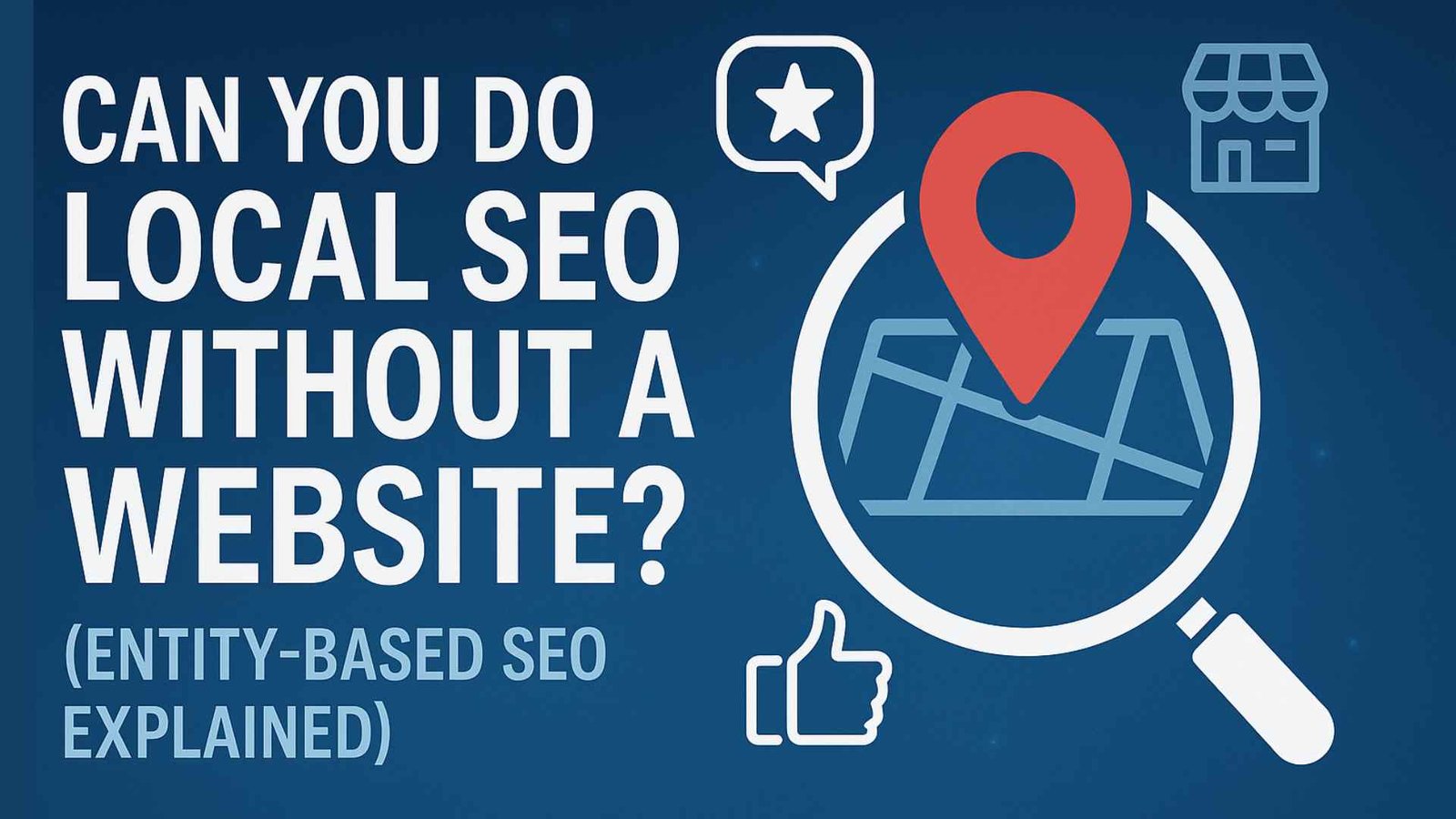Introduction: The New Reality of Local SEO
If you’re a small business owner wondering whether you can still rank locally without having a website — the short answer is yes, you absolutely can.
With Google’s increasing focus on entity-based search and local intent recognition, the playing field has changed. Search engines no longer need a website to understand who you are, where you operate, and what you offer. Instead, they rely on a collection of signals such as your Google Business Profile, reviews, citations, and social proof.
In other words, you can still dominate local search results by building strong entity signals, even if you don’t own a single webpage.
Let’s explore how Local SEO without a website really works — and how you can implement it effectively.
🧩 What Is Local SEO?
Local SEO (Search Engine Optimization) is the process of optimizing your business for visibility in local search results — particularly in Google Maps and the “Local Pack” that appears when users search for businesses near them.
When someone types “coffee shop near me” or “best electrician in Houston,” Google doesn’t just rely on websites. It uses entity data — real-world information such as business name, location, reviews, and popularity — to determine the most relevant local results.
Key elements that shape local visibility:
Relevance: How well your business matches what the user is looking for.
Proximity: How close you are to the searcher’s location.
Prominence: How well-known, trusted, and reviewed your business is.
Even without a website, you can influence all three through structured and verified local signals.
🌍 Why Websites Are No Longer Mandatory for Local SEO
Traditionally, websites acted as the primary “digital home” for a business. They hosted content, keywords, backlinks, and contact information.
However, Google now recognizes that many local businesses — plumbers, barbers, cleaners, tutors — operate offline-first.
So instead of requiring a website, Google builds entity understanding from multiple verified online sources:
Google Business Profile (GBP)
Facebook or Instagram business pages
Local directories and citation sites
Customer reviews and engagement
Mentions in articles, blogs, or news outlets
If all these signals consistently describe your business and location, Google can identify your entity — and display it in local search results.
🧠 How Google Understands Entities (Even Without a Website)
An entity is any identifiable thing — a person, business, place, or concept.
When Google recognizes your business as an entity, it connects data from various platforms to build a Knowledge Graph node. That node serves as your online identity, linking everything you publish or that others post about you.
So, instead of ranking web pages, Google ranks entities.
For example:
“Maria’s Hair Studio” can rank for “hair salon in Austin” even if it has no website — as long as it has a verified Google Business Profile, consistent NAP citations, and positive reviews.
This approach is called entity-based SEO — and it’s the foundation for Local SEO without a website.
🏢 Step 1: Optimize Your Google Business Profile (GBP)
Your Google Business Profile is your primary ranking tool when you don’t have a website. Think of it as your mini-website inside Google.
How to Optimize:
Verify your business — Claim your profile through Google Business Manager.
Complete every field — Add business name, address, phone number, hours, and service areas.
Select accurate categories — Choose your main service and related subcategories.
Add photos and videos — Visual proof boosts trust and ranking signals.
Use Google Posts — Publish updates, offers, or events weekly.
Respond to reviews — Activity signals tell Google you’re active and credible.
Pro Tip:
Add your social media links, booking URL, or WhatsApp link to your profile — this substitutes for a missing website and drives direct engagement.
🧾 Step 2: Build Consistent Citations Across the Web
Citations are mentions of your business information (Name, Address, Phone — known as NAP) across the web.
They help Google verify your business’s existence, category, and location accuracy.
Where to Get Citations:
Google Maps
Bing Places
Yelp
YellowPages
Apple Maps
Industry-specific directories (e.g., Avvo for lawyers, Houzz for contractors)
Best Practices:
Keep your NAP identical on all platforms.
Use the same business name and spelling everywhere.
Include photos and descriptions where possible.
Avoid duplicate listings — they confuse Google’s entity matching.
💡 When your information is consistent across multiple sites, Google’s algorithm strengthens your entity confidence score, improving visibility even without a domain.
💬 Step 3: Leverage Reviews and Ratings
Without a website, your reputation becomes your strongest ranking signal.
Reviews are not only user trust signals but also algorithmic authority signals. Google measures sentiment, frequency, and engagement when ranking local businesses.
How to Build Reputation:
Encourage customers to leave honest reviews.
Respond professionally to every review.
Include keywords naturally in your responses (“Thanks for choosing our cleaning service in Dallas!”).
Use visual reviews (photos or short clips) — these get more visibility.
Ask loyal customers to post on multiple platforms, like Facebook and Yelp.
A business with no website but strong, positive, and consistent reviews can easily outrank others with inactive websites.
📱 Step 4: Use Social Media as a Local Search Ally
Social platforms have evolved into local discovery engines. Facebook, Instagram, and even TikTok now power billions of local searches monthly.
When you don’t have a website, these platforms act as your secondary SEO infrastructure.
How to Use Them:
Create a Facebook Page with complete details and map pin.
Post regularly with local hashtags (e.g., #TorontoBakery, #AustinPlumber).
Tag your location in every post.
Add your contact details in the bio section of each platform.
Engage with local comments and community posts.
Google crawls public pages on Facebook, LinkedIn, and Instagram — treating them as entity sources.
This helps connect your brand with your location contextually.
🎥 Step 5: Publish Content on External Platforms
You don’t need a website to publish valuable content. You can still educate, engage, and rank by leveraging third-party platforms that Google indexes.
Recommended Platforms:
Google Business Posts (mini blog updates)
YouTube (videos about your services or local topics)
Medium or LinkedIn Articles
Facebook Notes or Guides
Press releases on reputable news sites
Strategy Example:
A local fitness trainer can:
Post workout videos on YouTube with titles like “Personal Trainer in San Diego”.
Write fitness tips on LinkedIn.
Share updates and transformations through Google Posts.
Google reads all these signals and merges them under your business entity — reinforcing your expertise and local authority.
🌐 Step 6: Strengthen Your Entity Across Platforms
To ensure Google recognizes your business as one unified entity, you must interlink all your profiles and maintain consistent data.
Checklist for Entity Consolidation:
Use the same business name and address everywhere.
Link your Google Business Profile to your Facebook or Instagram page.
Mention your business name + city in every post and bio.
Upload geo-tagged photos (images embedded with location data).
Encourage local media to mention your brand with your city.
Over time, this builds an entity cluster in Google’s Knowledge Graph — allowing your business to appear for local and branded searches even without a domain.
🧱 Step 7: Know the Limitations
While Local SEO without a website works, it does have limits:
You can’t create deep content to target multiple keyword variations.
You lose control over conversion design (no landing pages or analytics).
You have fewer schema markup opportunities.
You’re dependent on third-party platforms (which can change rules or remove listings).
That said, if your goal is visibility, not content marketing, you can still perform exceptionally well — especially in smaller cities or less competitive niches.
🧩 How to Transition to a Website Later
If you eventually decide to build a website, you’ll already have:
Verified entity trust
High review volume
Established local rankings
Indexed profiles and citations
When you connect your new domain to these existing profiles, Google immediately associates the site with your established entity — giving you an instant authority boost.
So, doing Local SEO without a website first can actually make your future website rank faster once launched.
🗺️ Summary: Local SEO Without a Website – Frame View
SEO Element Frame Action
Google Business Profile Business_Listing Verify, optimize, post regularly
Reviews Reputation_Management Build and respond consistently
Citations Information_Consistency Keep NAP data uniform
Social Media Platform_Visibility Publish and engage locally
Content Platforms Content_Sharing Use YouTube, LinkedIn, or Medium
Entity Linking Knowledge_Graph Interlink and geo-tag all data
✅ Final Thoughts
Can you do Local SEO without a website?
Yes — and in many cases, quite successfully.
By focusing on entity-based optimization, consistent local data, and authentic reputation building, you can appear in Google Maps and local results without spending a penny on web hosting.
Remember, Local SEO today is about who you are, where you are, and what people say about you — not just what’s on your website.
Start with your Google Business Profile, expand to citations, reviews, and social channels, and you’ll see your local visibility grow — website or not.



